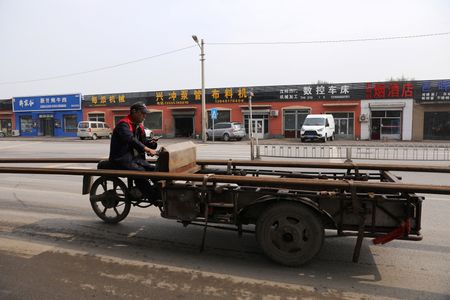By Liangping Gao and Ryan Woo
BEIJING (Reuters) -Profits at China’s industrial firms fell at a faster clip in the January-September period as COVID-19 curbs and a property crisis continued to weigh heavily on factory activity, piling pressure on firms grappling with weak demand and high costs.
China’s strict “zero-COVID” policy of constantly monitoring, testing and isolating its citizens to prevent the spread of the coronavirus has battered the country’s economy and manufacturing sector. Signs of weakening global demand are also weighing more heavily on export-oriented manufacturers.
Profits fell 2.3% in the first nine months of 2022 from a year earlier, after a 2.1% drop in the January-August period, according to data from the National Bureau of Statistics (NBS) released on Thursday.
The recovery in profits faces challenges as some industrial firms with high costs and declining profits have difficulties in production and operation, said Zhu Hong, senior NBS statistician, said in a statement.
“In the future, China will focus on the development of the real economy, efficiently coordinating COVID-19 prevention and control and economic development, in order to make a series of policy measures take effect.”
The bureau did not report standalone figures for September and August, but said in a separate statement that the decline in profits at industrial firms in September narrowed by 6.0 percentage points compared with the previous month.
The Shanghai Industrial share sub index is down nearly 20% so far this year.
After nearly contracting in spring, China’s third-quarter economic growth was faster than expected, helped by a raft of government measures.
September activity data showed strong industrial output, but prolonged property woes, slower exports and stubbornly weak retail sales are clouding the outlook for a more robust recovery in the longer term.
For January-September, profits at state-owned companies rose 3.8% on year while foreign, Hong Kong, Macau and Taiwan-invested enterprises and private firms both reported profit declines, down 9.3% and 8.1%, respectively.
However, for upstream companies, the mining sector reported high profits, with a cumulative year-on-year increase of 76.0%, while profits in the manufacturing sector fell 13.2%.
Higher oil prices and rise in import costs from a weaker yuan have also added to companies’ woes in recent months.
Zhou Maohua, analyst at China Everbright Bank, said some manufacturing industries in the middle and downstream segments were facing pressure from the cost of energy and raw materials.
The authorities should maintain their policy measures aimed at stabilising supply and prices, Zhou added.
Despite better-than-expected third quarter GDP growth, analysts at Goldman Sachs cut their fourth quarter growth forecast to 3.5% on a quarter-on-quarter annualised basis from 5.0% previously.
“High-frequency data including emerging industries PMI (EPMI), new home sales, auto sales, transportation and long holiday tourism revenue pointed to a likely weak start in Q4,” Goldman Sachs analysts said.
China Resources Cement Holdings Ltd, among the country’s largest cement producers, reported last week that its nine-month turnover fell 22% to HK$24.2 billion ($3.1 billion).
Industrial profits data covers large firms with annual revenues above 20 million yuan ($2.79 million) from their main operations.
($1 = 7.1652 Chinese yuan)
($1 = 7.8493 Hong Kong dollars)
(Additional reporting by Ella Cao; Editing by Jacqueline Wong)

